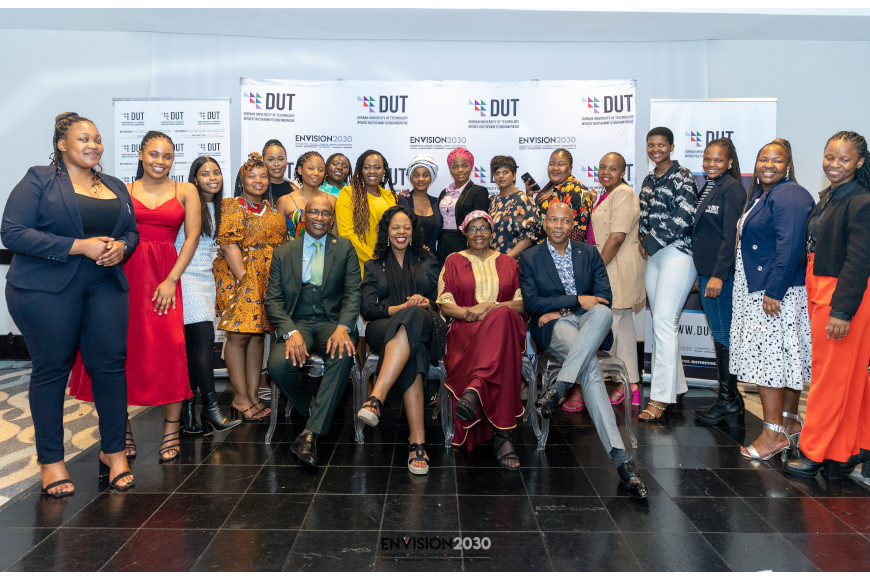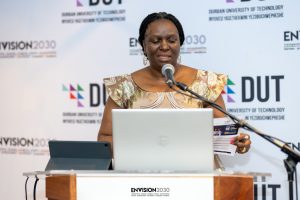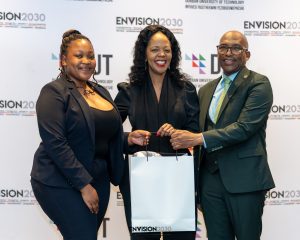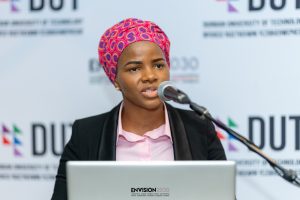The office of the Vice-Chancellor and Principal at the Durban University of Technology (DUT) hosted the Student Leaders Engagement at the Southern Sun Elangeni Hotel on Tuesday evening, 29 August 2023.
The theme of the event was “Empowering Tomorrow’s Female Leaders to Be Adaptive Contributors that Move the Nation Beyond its Historical and Present Shackles”.
The programme director was Prof Gugu Mchunu, Executive Dean of the Faculty of Health Sciences at DUT. In her opening remarks Prof Mchunu began by welcoming distinguished guests present, DUT Vice-Chancellor and Principal, Professor Thandwa Mthembu, Registrar, Dr Maditsane Nkonoane, Executive Dean: Faculty of Arts and Design, Prof Runette Kruger, Dean of Students, Dr Clement Moreku and SRC Deputy President, Thandolwethu April.
She acknowledged the presence of the two powerful women who have made their indelible mark, Dr Judy Dlamini, Founder and Executive Chairman of Mbekani Group and Chancellor of Wits University and Professor Nthabiseng Ogude, Professor of Science Education at the University of Pretoria, who were the keynote speakers. She also acknowledged the presence of the DUT young women who were being honoured at the event, these included the past and present Hlomisa Skills Academy Fellows, and the Student Representative Council.
In her welcome remarks, Prof Mchunu said that there is a complex debate around the education of women, and this indicates that there is this gender inequality and that there are issues around race, locality of young women and some girls face several barriers some of which are more systematic.
“In the space of science, technology, engineering and mathematics, there are education disparities which are deep rooted in the institutions of higher education in South Africa but maybe even globally. The Durban University of Technology understands its mandate of educating young women. This initiative at DUT, the Hlomisa Skills Academy is based on the principle that educating our young women and mentoring them to take up leadership positions is key to tacking our most global challenges. Hlomisa which in isiZulu means to arm, so we are arming these young women. This programme is intended to accelerate the growth and development of our younger A-performers to reach their full potential,” said Prof Mchunu.
Sharing the purpose of the event was Dr Matheakuena Mohale, Director of Special Projects in the Office of the Vice-Chancellor and Principal. He said that over and above the Hlomisa Fellows, his office also extended an invitation to the members of the immediate past Student Representative Council (SRC) and current SRC.
“For the past few years under the Student Services, we also produced the VUNA Leadership Academy, so an invitation was also extended to them. One of the things that I learnt in the six years of my life at DUT, is the consistency of the Vice-Chancellor and Principal in the system in that whatever that we do, we must do it by design and not by default. We recruited the first cohort of Hlomisa in the late 2019, in the last few years I have seen we have deliberately moved towards bringing SRC closer to Hlomisa. That is why we decided to invite the SRC so that we begin to create platforms for these important conversations,” said Dr Mohale.
He added that hosting this event was their unique way of contributing towards the strategic objectives called distinctive education on ENVISION2030 by bringing together young women in leadership spaces to come and exchange ideas with those that have already travelled the road and have seen it all.
The first keynote speaker was Dr Dlamini, she spoke at length about becoming an adaptive leader. She defined adaptive leadership as leading with a team and not just a top-down approach. Unpacking the characteristics of adaptive leaders, Dr Dlamini spoke on the four As of Adaptive Leadership namely, Anticipation, Articulation, Adaptation and Accountability.
“Anticipation speaks to staying abreast and being a lifelong learner. You need to stay abreast with what is happening in the world, what is happening in your context, what is happening in the different sectors that might have an influence in your own space. That is not all, you need to be able to articulate what you see, what you foresee and what that means for your organisation with the team that you lead with. This requires effective communication, some leaders think being a leader is about showing how much you know by being the one who talks a lot, not realising how powerful it is to listen more and take decisions based on all the ideas around the table,” said Dr Dlamini.
She emphasized the importance of taking accountability for the things that one does and does not do. Dr Judy stated that it is difficult for a leader not to make mistakes but a great leader acknowledges the mistakes that he or she makes and takes the ownership and responsibility of the decisions that they make.
Dr Dlamini also shared the four principles of adaptive leadership namely; emotional intelligence, organisational justice, development and character, which she said come in handy when collective leadership becomes challenging. She left the young women inspired and motivated to become adaptive leaders.
Sharing the same sentiments was the second keynote speaker, Prof Ogude who was the first black woman to obtain a PhD in Chemistry at Wits university. She stated that this gave her a challenge to get more women to follow in her footsteps by establishing the discipline of Chemistry Education.
“When I graduated at Wits, I had no clue that I was the first black woman to get a PhD in Chemistry. When that was read by my supervisor, two things crossed my mind. I was very proud and the second one was that I have a responsibility to change this. It weighed on me on how could it be that in 1992 when I graduated that South Africa all these years has never had a black woman obtaining a PhD in Chemistry. I took that seriously and I was also being told that women cannot do science. I could not accept that,” said Prof Ogude.
She advised the young women to embrace who they are, be committed as ambition without commitment is not sustainable and lastly she emphasized the importance of striving to be financially independent.
A Hlomisa Fellow and PhD candidate, Ms Sanelisiwe Dlamini shared the words of appreciation to the speakers on behalf of all the young women in attendance.
In closing the DUT Registrar, Dr Maditsane Nkonoane thanked the keynote speakers for their insightful presentations. He thanked the young women leaders in attendance for their presence and urged them to take away the wisdom shared by the brilliant minds that will help them become great leaders.
The guests left in high spirits and ready to change lives after the powerful presentations and each taking home three books from the two speakers.
Pictured: Attendees at the Student Leaders Engagement event.
Photographer: Khulasande Tshayile.
Simangele Zuma





